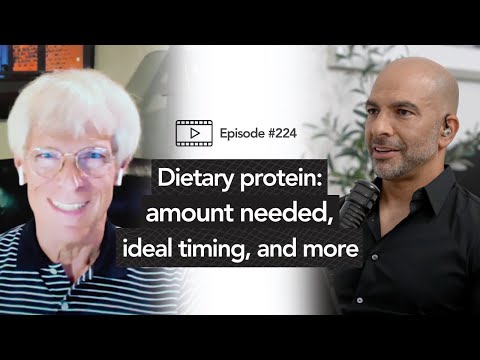Agree completely with @Joseph_Lavelle and @scta123. I would like to shift back to the protein issue. IMO there is a distinct lack of clarity of protein and its effects on longevity/healthspan. In animal studies it’s pretty clear that you can extend lifespan via protein restriction…I’m not arguing that. (Although there was an Australian mouse study that looked at various diets and the ad libitinum fed mice on a 40% protein diet lived the longest) But there are a couple of flavors of protein restriction. You can restrict all protein or you can restrict certain amino acids (tryptophan, methionine and BCAAs). What’s not clear is that the mechanisms are exactly the same across these different flavors. The common mechanism appears to be MTOR inhibition. This gets complicated with its translation to humans. We know protein is an activator of MTOR, particularly BCAAs can activate MTOR through certain mechanisms (through sestrins, etc.) So, it seems that protein restriction would be great in humans as it “turns down” MTOR and BCAAs in the diet would hyperactivate it. The thing that seems important in total protein restriction is the effect on FGF21 which is secreted in response to a low protein diet and affects MTOR and IGF-1. The question, however, is can protein restriction be separated from caloric restriction. What I believe was found was that if you restricted things like tryptophan and methionine, mice actually ate more, didn’t gain weight and lived a little longer. The exact way methionine affects the whole process is still being parsed out. There’s also the complication that inhibiting MTOR inhibits protein synthesis overall.
The question then comes to be how long is MTOR inhibited after the ingestion of protein. This is difficult as well because it probably has to do with what you eat with the protein, when you eat the protein and how much protein. If I recall correctly, studies which looked at the leucine sensor on MTOR, found that BCAAs significantly effect MTOR but for a very brief period of time. We also need to consider that it’s not how high MTOR signaling gets or for how long, but also where. This is made most obvious by Rapa not inhibiting muscle growth despite inhibiting MTOR. It doesn’t inhibit growth in mice, humans or dogs despite everyone saying for years that it would.
The difficulty for humans is that there is a plethora of problems when they are under muscled. Muscles are the single largest sink for glucose and responsible for glucose homeostasis, to say nothing of the impact of sarcopenia. We don’t do any studies with mice or primates in a setting where sarcopenia or osteoporosis is problematic. Yet in humans over 75 the percentage of people suffering from both is considerable and their activity level and muscle mass is at a low. I would argue that longevity doesn’t matter if your body structure is poor. Protein combined with hypertrophy training is need for body structural support.
This shifts us to the study by Longo looking at protein consumption and all cause mortality as a function of age. The message was that low protein was beneficial up to a certain age then after attaining a certain age you wanted higher protein. The question here, though is what are the relative effects. The relative impact of the low protein diet early in life would have to be an order of magnitude greater than the relative impact of the high protein impact later in life. Meaning the benefit you would get from a high protein diet over a certain age would outweigh any detriment you would have from starting earlier. Then the question is, are there studies on frailty, a low protein diet and resistance exercise? I’m not sure.
I guess the point I’m getting at is that protein and longevity/healthspan in humans is murky at best. We’d need to answer if low protein and resistance exercise in people over a certain age can stave off sarcopenia or osteoporosis, because we know high protein can. We’d also need to answer if extended lifespan with low protein comes with any associated risks we wouldn’t see in mouse or primate studies. We’d also need to answer whether mice have a higher tolerance for low protein diets than humans. I don’t know the answer to any of these, nor do I know the answer to the high or low protein question (and what the true definition of high or low protein is as measured by mg/kg/d, different studies define it different ways).
The bottom line to me is whatever beliefs we have we can probably find studies to back it up. I lean toward high protein, but thoroughly respect those who don’t. We’ll only know how well we did once we cross the finish line.
Here is the Longo study for reference:
https://www.cell.com/cell-metabolism/fulltext/S1550-4131(14)00062-X
